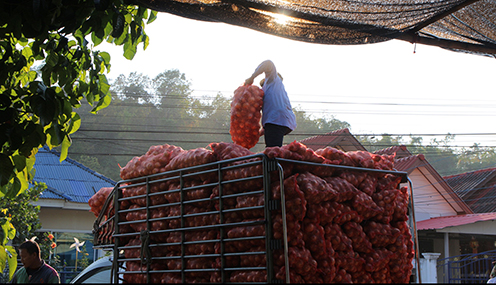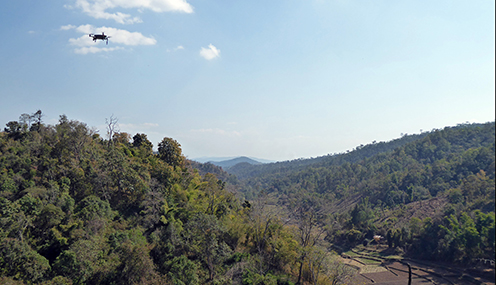Beyond the ‘Supermarket Revolution Myopia’
Traditional Markets and Sustainable Upgrading Opportunities in Domestic Food Value Chains
The overall objective of this research project is to analyse the multi-scalar dimensions of food value chain transformations in selected traditional and modern food value chains in Thailand.
The modernization of agri-food systems – depicted through the rapid rise of supermarkets – has shifted the attention of academia and decision-makers away from traditional and mostly informal food markets to the notion of ‘value chain agriculture’ and the prospects of so-called ‘high value’ modern markets. The now dominant development paradigm prescribes that smallholders must ‘upgrade’ and adapt to the new requirements set forth by supermarkets to avoid eventually being driven out of the market, and instead be able to reap the benefits of modern market participation.

The “supermarket revolution myopia” masks a number of simultaneous modernization trends pertaining to the Global South where supermarket-driven food value chains are only one of the many forces affecting the modernization of agri-food systems, and they do not evolve or operate separately from the traditional food sector. Traditional markets persist and have been found to be resilient which points to their inherent social and economic values, that are only poorly understood. Further, scant attention has been devoted to the role of traditional wholesale markets as spaces of interaction between traditional and modern food value chain actors.
This is striking, because despite modernizing procurement systems and the widely perceived inability of traditional markets to accommodate private quality and food safety standards, previous research has showed that supermarkets in the Global South still to a great extent rely on fresh food supplies from the traditional food sector. Why this continues to be the case and what kind of restructuring dynamics this causes along the traditional food value chains are understudied issues.

This research project seeks to develop a framework for studying traditional and modern food value chains simultaneously and in relation to each other. It enables us to critically investigate the notion of development at the local level in a way that includes socio-economic implications of upgrading and impacts on the natural environment. Further, by conceiving food value chains as systems of resource flows, our analytical framework provides an integration of value chain analysis with environmental interactions that occur at every node in the chains.
Scope of research
The research project addresses three main analytical questions:
In what ways are the modes of governance in modern and traditional food value chains being transformed?
- How and by whom are product specifications and standard requirements determined in the two types of food value chains?
- What is the extent and nature of retailers’ sourcing strategies and spaces of interaction between the two food value chains?
- What is the extent and scope of relationships between actors in the two types of food value chains, how were they established and on which basis?
What are the socio-economic upgrading trajectories in domestic food value chains?
- What are the barriers to entry into in agricultural production and retail in the two types of food value chains?
- What is the value creation the two types of value chains in terms of employment creation and production technologies?
- What is the nature of value creation, enhancement and economic expansion and diversification within each node of the food value chains?
- To what extent is it influenced by chain dynamics? What is the scope and degree to which surplus is retained and re-invested at the local level?
To what extent do impacts on the environment differ in traditional and modern food value chains?
- What are the current farm management practices in the two types of food value chains and what motivations are underlying the farmer’s management decisions?
- Are current practices leading to environmental impacts that are jeopardizing the long-term sustainability of agro-ecosystems?
- How much post-harvest losses do accrue in each node of the two types of value chains (volume/quality/value)?
In-depth qualitative interviews with retailers at traditional markets and supermarkets, preferred suppliers, traders and selected farmers to obtain data on governance relationships, spaces of interaction between the two types of food value chains and upgrading trajectories along the chains with a particular focus on the notion of value and the associated socio-economic upgrading effects.
A farmer survey will provide quantitative data on farmers’ land use management, marketing strategies, market channels, and compliance with requirements at markets (e.g., quality, volume, food safety and quality standards).
Quantification of the environmental key indicators at the production and distribution levels in the two types of value chains. The survey entails a generic questionnaire on agricultural management practices, supported by field level flow diagrams and field area measurements to obtain detailed information on input/output parameters.
Waste production at different nodes of the value chains will be quantified by a combination of direct measurements and interviews with relevant actors in the food value chains.
Participants
Department of Geosciences and Natural Resource Management, University of Copenhagen
| Name | Title | Phone | |
|---|---|---|---|
| Search in Name | Search in Title | Search in Phone | |
| Marianne Nylandsted Larsen | Associate Professor | +4535324167 | |
| Sinne Borby Ørtenblad | Assistant Professor | +4535332064 | |
| Thilde Bech Bruun | Associate Professor | +4535333412 |
Faculty of Agriculture, Chiang Mai University
| Navn | Titel | Telefon | |
|---|---|---|---|
| Pornsiri Suebpongsang, | Assistant professor |
Founded by:
 The research project is funded by the Danish Council for Independent Research – Social Sciences (Denmark).
The research project is funded by the Danish Council for Independent Research – Social Sciences (Denmark).
Project:
Beyond the ‘Supermarket Revolution Myopia’ – Traditional Markets and Sustainable Upgrading Opportunities in Domestic Food Value Chains.
Periode:
October 2017 to March 2022
Contact
Marianne Nylandsted Larsen
Associate professor
Department of Geosciences and Natural Resource Management
University of Copenhagen
E-mail: mnl@ign.ku.dk
